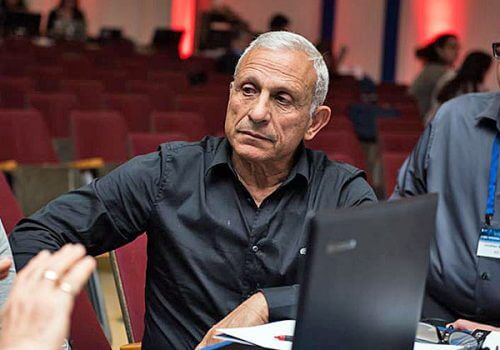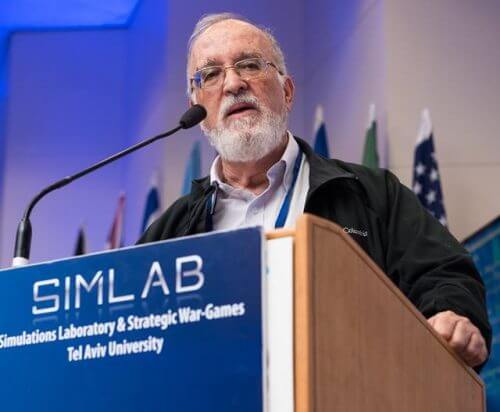"Unlike bombs and knives in the streets, and rockets from Gaza, where we know what to do and how to respond, a cyber war may catch us off guard," said Major General (res.) Eitan Ben Eliyahu, former commander of the Air Force at a conference held by the Yuval Na'eman Workshop for Science, Technology and Security and the Cyber Center at Tel Aviv University.

"Israel is not prepared for a powerful cyber attack. Unlike bombs and knives in the streets, and rockets from Gaza, where we know what to do and how to respond, a cyber war may catch us off guard," said General (res.) Eitan ben Eliyahu, former commander of the Air Force.
He noted that "a recent exercise showed that we are far from such preparedness and apart from closing the counters ofElectric Company, the banks and the like, we don't have many plans in case of a major cyber attack, the aim of which is to disrupt life in Israel."
Colonel (res.) Ben Eliyahu played the Prime Minister of Israel in a simulation game held recently at Tel Aviv University, in which individuals and groups representing different countries and their decision makers participated.
The game began with a strange chain of accidents that supposedly happened across France, after suddenly, without warning, trucks veered off the tracks they were traveling on and caused dozens of fatal accidents. Later, trains carrying dangerous materials derailed from the tracks in Portugal, and European countries were forced to close nuclear power plants and disrupt the electricity supply to residents, to prevent damage from a cyber attack. The events became more and more intense, and in addition to cyber events, physical terrorist attacks occurred.
According to Ben Eliyahu, "Targeting terrorism, despite being decentralized, can be effective. Terrorist organizations have thinking that goes out of all proportion, great courage and good planning - the events of September 11 illustrate this well. They can carry out terrible and terrible attacks with cyber tools as well. In cyber terrorism you don't have to commit suicide, and you can do many difficult things in many countries in a short time."
"The fear is that the deterioration could be steep and this forces the leader to fall into a terrible dilemma," he said. "If you react quickly and sharply, you may cause a deterioration, and if you are late, even a little, you may be kidnapped and suddenly find yourself with paralyzed systems, which will reduce the effectiveness of the response."
"Another fear is that there will be countries that will take advantage of the chaos and join terrorist organizations such as ISIS in their cyber attacks without being exposed. For example, Iran", estimated Ben Eliyahu.
"Alternative means of intelligence must also be activated"
"In the scenario in the simulation, we had to declare a state of emergency in the country, and we saw that we were not used to it. We have no idea what to do except ask people to shut down the Internet, stop driving cars and, of course, shut down Ben Gurion Airport," said Ben Eliyahu.
"Israel needs to prepare for cyber threats, at least for absorption, as early as possible, but even if we assume that we have taken the necessary absorption actions, we have no experience in a major cyber attack," he added.
According to him, "As in any attack, in a cyber attack we must respond, but identifying the source of the attack takes between four and eight weeks, while such a war would not last more than a few days."
"Technological means may not work because of the cyber attack and therefore, the solution is to use alternative - human intelligence means during the war. For example, eavesdropping," Ben Eliyahu pointed out. "It is essential to establish a human intelligence infrastructure around the world to know where the attack came from. In addition, we must develop and improve our absorption capacity and we may have to, at some point, abandon the control systems and switch to a simple and primitive system, which is the only way we can operate."
"There is almost no cooperation between countries in the cyber field"

"Countries see the technologies in the cyber field as a national asset that needs to be protected, and therefore they are reluctant to cooperate; The bad guys can take advantage of this," said Major General (res.) Prof. Yitzhak Ben Israel from Tel Aviv University
"Technological cooperation between countries in the cyber field is almost non-existent. Each prefers to take care of things on its own and rarely shares its knowledge in the field with other countries," said Major General (res.) Prof. Yitzhak Ben Israel, head of the Yuval Na'eman Workshop and director of the Blavatnik Cyber Center at Tel Aviv University.
He noted that "countries see the technologies in the cyber field as a national asset that needs to be protected so that it does not reach others, and therefore they do not encourage cooperation. The bad guys can take advantage of it."
Prof. Ben Israel said these things following a simulation game held recently at the university, in which individuals and groups representing different countries and their decision makers participated.
The game began with a strange chain of accidents that supposedly happened across France, after suddenly, without warning, trucks veered off the tracks they were traveling on and caused dozens of fatal accidents. Later, trains carrying dangerous materials derailed from the tracks in Portugal, and European countries were forced to close nuclear power plants and disrupt the electricity supply to residents, to prevent damage from a cyber attack. The events became more and more intense, and in addition to cyber events, physical terrorist attacks occurred.
Prof. Ben Israel said that "the question we wanted to find out through the game was to what extent it is possible to generate international cooperation in order to fight this type of scenario. Not much cooperation was created around the table. It is difficult to create this partnership in areas where the common interest is clear, such as climate. It is all the more difficult to cooperate in the fight against ideological terrorism, especially when it is carried out through cyber attacks."
"This helps the uncertainty that exists to some extent in cyber attacks anyway," he noted. "The uncertainty makes the difficulties insoluble. But a solution must be found. Generally, countries are not willing to enter into collaborations unless they get something in return. Therefore, you need to go down 2-3 levels below the leaders, not at the political level."

3 תגובות
The problem with cyber is the costs. When you put a cyber trustee in a project, it turns the project in terms of costs into a cyber project and a little more project instead of a project and another cyber complex. It is not possible to install a system to detect cyber attacks near every endpoint and that is what they want. There are intermediate solutions that give less but enough.
It is appropriate to write in pure Hebrew
Because when they try to tilt the goat according to the Hebrew laws
"alternatives" - (alternatives), "simulation" - (simulation),
"Technologies" - (without bias = technology), "Primitives" - (initial),
An unnecessary steering wheel is received…
We've had enough of the foreign language in the media...
It is worth correcting the rank listed below the picture of General (resp.) Eitan ben Eliyahu (and also adding the "resp.") as it appears correctly in the rest of the article.